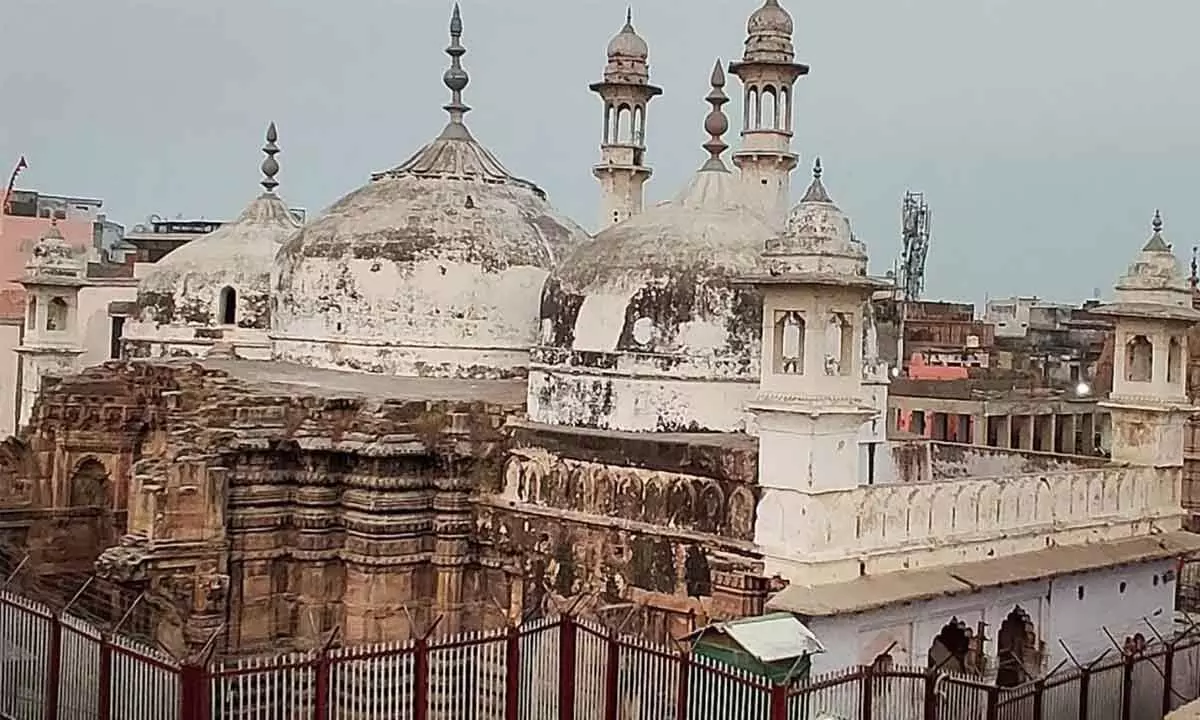Gyanvapi ownership: Point, counter-point; the debate goes on
On the orders of a lower court of Varanasi, a detailed survey of Gyanvapi Masjid was carried out by the court-appointed commission, about 12 hours of videography and around 15 thousand photographs were taken
image for illustrative purpose

The prolonged dispute of Ram Janmabhoomi and Babri Masjid in Ayodhya has been resolved through the courts. Even as the construction of Ram temple has started, there in Ayodhya, yet another legal battle has started over Gyanvapi Masjid, located in Kashi, a little above two hundred kilometres away from Ayodhya.
Kashiis known as the city of salvation and the capital of Sarva Vidya, so people from not only India but also from abroad had come and settled here centuries ago due to their religious faith. However, there is a sort of uneasiness in Varanasi for more than a fortnight over the legal dispute that arose over Gyanvapi Masjid. On the orders of a lower court of Varanasi, a detailed survey of Gyanvapi Masjid was carried out by the court-appointed commission, about 12 hours of videography and around 15 thousand photographs were taken.
On the last day of the survey of the three-member commission, the Hindu side had claimed to have found a Shivling here, while the Muslim side rejected the claim of the Hindu side outright. There were reports that during the survey, a swastika symbol, temple debris and lotus were found.
History of Gyanvapi located in Kashi
The dispute about Gyanvapi Masjid has been going on for a long time, which has also been mentioned in history. In the annals of history, it was mentioned that Vishwanath temple in Varanasi was demolished and a mosque was built in its place. It was also said that not only was the temple demolished during the time of Aurangzeb, but several times during Delhi Sultanate period and thereafter.
Many sultans and invaders repeatedly destroyed temples in Kashi. The reason behind the dispute of Gyanvapi complex is that a temple was demolished to construct a mosque. In August 2021, five women filed a petition in the Varanasi court claiming the presence of Maa Shringar Gauri Mandir inside. They sought court's permission to worship the goddess
Hearing the petition filed by the women, the court ordered that a survey should be carried out at the mosque complex.
But this was not the first time that Gyanvapi dispute went to court. The first case was filed in the lower court in the year 1936 by Deen Mohammad. He sought a declaration from the court that the land surrounding disputed Gyanvapi Masjid belonged to Waqf. But the court refused to accept the argument. The petitioner appealed to the Allahabad High Court in 1937. The High Court dismissed the petition.
After the Allahabad High Court's decision, there was no dispute regarding the Gyanvapi complex till 1991 when a petition was filed in the Varanasi court seeking construction of a new temple in Gyanvapi complex and the permission for worship. It was argued in the petition that the original temple of Kashi Vishwanath, which was built by King Vikramaditya about 2050 years ago, was demolished by Aurangzeb in 1669 to build a mosque here.
On this petition, the Civil Judge (Senior Division) ordered the claim to be pursued. This was challenged by both the parties before the Civil Revision District Judge. The court set aside the decision of the civil judge and ordered to collect evidence of the entire complex. After this, the Anjuman Intejamiya Masjid Committee, which oversees the Gyanvapi Masjid, argued before the Allahabad High Court that no decision could be taken in this matter, as it was prohibited under the Places of Worship Act 1991. The High Court stayed the decision of the District Judge. The dispute came to fore again now after news broke out that a shivaling was found in masjid water body during the survey. However, according to the Places of Warship Act, alterations can't be carried to any religious place which was in place on or before 15 August 1947.
But the moot question is whether Gyanvapi Masjid issue will turn out to be yet another religious dispute in India.

